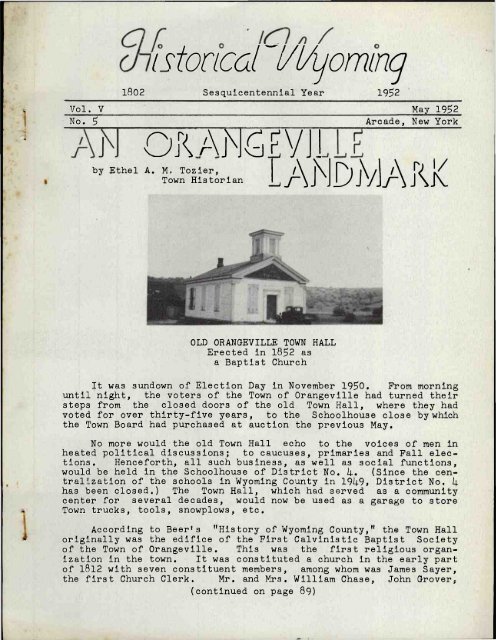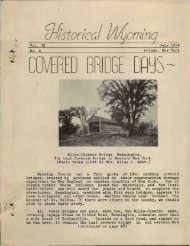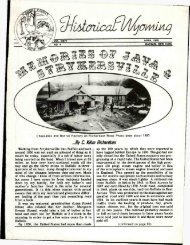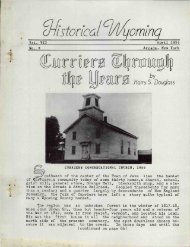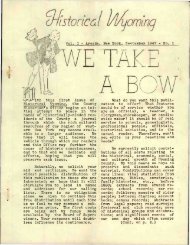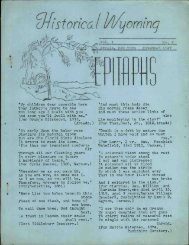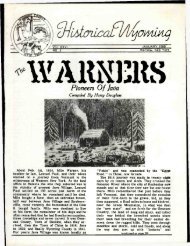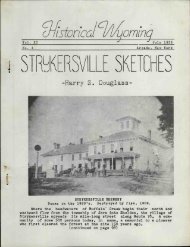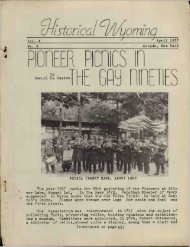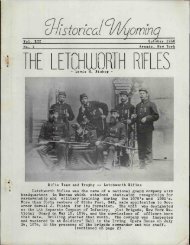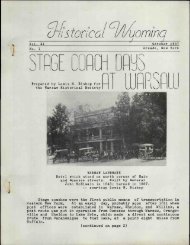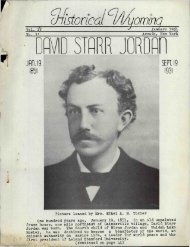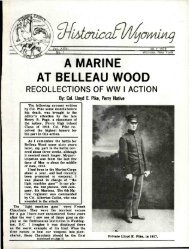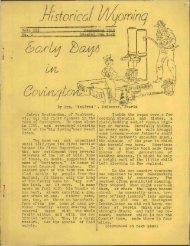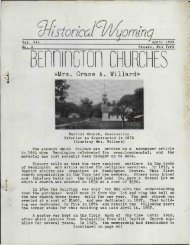Historical Wyoming County May 1952 - Old Fulton History
Historical Wyoming County May 1952 - Old Fulton History
Historical Wyoming County May 1952 - Old Fulton History
Create successful ePaper yourself
Turn your PDF publications into a flip-book with our unique Google optimized e-Paper software.
(storied 1/lAjormnq<br />
1802 Sesquicentennial Year <strong>1952</strong><br />
Vol, V <strong>May</strong> <strong>1952</strong><br />
No, 5 Arcade, New York<br />
O J I A j N ^ V J I<br />
by Ethel A., M, Tozier,<br />
Town Historian IAjNDJVIARK<br />
OLD ORANGEVILLE TOWN HALL<br />
Erected In 1852 as<br />
a Baptist Church<br />
It was sundown of Election Day in November 1950. Prom morning<br />
until night, the voters of the Town of Orangeville had turned their<br />
steps from the closed doors of the old Town Hall, where they had<br />
voted for over thirty-five years, to the Schoolhouse close by which<br />
the Town Board had purchased at auction the previous <strong>May</strong>.<br />
No more would the old Town Hall echo to the voices of men in<br />
heated political discussions; to caucuses, primaries and Pall elections.<br />
Henceforth, all such business, as well as social functions,<br />
would be held in the Schoolhouse of District No. (Since the centralization<br />
of the schools in <strong>Wyoming</strong> <strong>County</strong> in 191+9, District No. I4.<br />
has been closed.) The Town Hall, which had served as a community<br />
center for several decades, would now be used as a garage to store<br />
Town trucks, tools, snowplows, etc.<br />
According to Beer's "<strong>History</strong> of <strong>Wyoming</strong> <strong>County</strong>," the Town Hall<br />
originally was the edifice of the First Calvinistic Baptist Society<br />
of the Town of Orangeville. This was the first religious organization<br />
in the town. It was constituted a church in the early part<br />
of 1812 with seven constituent members, among whom was James Sayer,<br />
the first Church Clerk. Mr. and Mrs. William Chase, John Grovers<br />
(continued on page 89)
Page 89 <strong>May</strong> <strong>1952</strong><br />
HISTORICAL WYOMING<br />
Published six times annually at Arcade, New York, by Harry S.<br />
Douglass,<strong>Wyoming</strong> <strong>County</strong> Historian; Robert W. McGowan, Associate<br />
Editor, and Students of Arcade Central School.<br />
AN ORANGEVILLE LANDMARK (cont.)<br />
Nicholas Reddish, William DeVoe, Job Whiting, and Mr. and Mrs.<br />
Elisha Doty were early members. The first addition to the church by<br />
baptism was Mrs. Elizabeth Merrifield.<br />
Rev, Butler and Rev. Case were probably the first preachers,<br />
followed by Elders Jonas Tuttle, Stutson, Anson and Jabez Boomer.<br />
The latter became a resident of the town as early as 1823. He remained<br />
several years after which he moved to Ohio.<br />
The First Calvinistic Baptist Society of the Town of Orangeville<br />
was incorporated on January 11, 1823, at a meeting held in the<br />
log-cabin schoolhouse of District No. I)., (on the site of the present<br />
schoolhouse on Route 20-A near Orangeville Center.) Trustees elected<br />
at that time were James Sayer, John Grover, John W. Meddick, Festus<br />
Pettibone, Isaac Boardman, Eli Rood and Oliver Hoisington, The<br />
Society was reincorporated March 16, I8I4.2 under the same title, at<br />
which time Ephraim Wheeler, Alfred S. Wilcox, Amos Winslow, John<br />
Chapin, Charles J. Blackmer, Daruis Stone and Hiram Jones were<br />
elected trustees. Thereligious and business meetings of the church<br />
and society were held at various places, principally in the schoolhouses<br />
in the central and northern portions of the town, until 1852,<br />
when a frame meetinghouse, 32 x I4.O feet in size, was built on land<br />
donated by Ephraim Wheeler. The structure Cost $1200.00.<br />
Elder Jabez Boomer closed a pastorate in the beginning of 1333*<br />
He was followed by Rev. Peter Freeman. In July 133^, the church<br />
granted a license to one of its members, Chester Coe, to preach.<br />
He was ordained and installed pastor March 18, 1835> and continued<br />
until September 3» 1836, when he was deposed from the ministry. The<br />
deacons in 1833 were James Sayer and Ezra Olin. Ira Jones was chosen<br />
clerk in October of the same year, in <strong>May</strong> l337> Rev. Jabez 'Boomer<br />
returned from Newbury, Ohio, and again assumed the pastorate of the<br />
church. He remained until I8I4.O. Rev. Alba Thorp, Rev. Thomas Moses<br />
Pickett, Rev. Thomas Phillips and Rev. P. Nichols followed.<br />
Alvin Plumley, a licentiate from Hume, Allegany <strong>County</strong>, became<br />
a member of the church on November 7> l8Ij-5 and supplied the pulpit<br />
for a time. He was ordained September 30, I8I4.5 and preached until<br />
the spring of l81_(-7• He was followed by Rev. William Baxter from<br />
Bethany (l85'3-l859) and Rev. Russell T. Smith a year or two later.<br />
During the year l867» Rev. D. B. Morgan was pastor after which the<br />
pulpit was supplied for a time by Elder W. I. Crane of Warsaw,<br />
Thereafter the church had no regular minister and only occasional<br />
preaching. In 1S51+, there were I4.3 members, in 1867 there were 3^4-*<br />
CHURCH BECOMES TOW HALL<br />
On November 29, 1913? the Town of Orangeville bought the church<br />
edifice for $50.00. A new floor was laid and other improvements<br />
(continued on page 90)
<strong>May</strong> <strong>1952</strong> Page 90<br />
AN ORANGEVILLE LANDMARK fcont.)<br />
made. A new sign high over the door proclaimed that the old Baptist<br />
Church was now "Orangeville Town Hall, 1913."<br />
Prom 1913 to 1950, the Town Hall not only witnessed caucuses,<br />
primaries and elections but many other forms of entertainment. Before<br />
this time, elections had been held in the second floor dance<br />
hall in the home of Mr. J. 0. Spink» This building had been formerly<br />
a tavern. It also housed the Post Office before the Rural Free Delivery<br />
brought the mail from Warsaw. (This tavern stood on the site<br />
of the home at present owned by Mr. Fred Burr at the intersection of<br />
Route 20-A and the Allegany Road at Orangeville Center.)<br />
During World War I, the Town Hall was a busy place. Meetings<br />
were held at which the women knitted scarfs and sox for the Red<br />
Cross to be sent to the soldiers in Europe. Many Red Cross dances<br />
were held to raise money for that worthy organization.<br />
During World War II, farewell suppers were given to the boys<br />
leaving for the Service, After the supper was over, the windows<br />
rattled to the sound of "Swing your partner." The Burr and Snyder<br />
boys furnished the music and Fred Burr was the caller. Later a<br />
purse was given to the boy who was leaving.<br />
At the supper given for Roland Orury, many of the Orangeville<br />
folk were surprised by being served roast deer meat. Roland had been<br />
lucky during the deer season and brought down a fourteen point buckthe<br />
largest that a local hunter had ever bagged. Roland's father,<br />
Lambert Drury, had been an Army Cook in World War I and he had prepared<br />
the delicious venison for txie crowd.<br />
First Aid classes were held in the Town Hall, beginning in September<br />
19^+2. Mrs. Mildred Stearns of the Warsaw Red Cross Chapter<br />
was instructor and kept everyone on their toes. Instruction in<br />
bandaging, care of burns and wounds, artificial respiration, etc.<br />
was given.<br />
The mental picture of those artificial respiration classes<br />
still brings a smile. Twenty to thirty men, women, boys and girls,<br />
each one eager to learn how to save a possible drowning victimi Perspiring<br />
plump women, fat men, tall lean farmers with calloused hands,<br />
towseled youths and giggling girls I Teams of two were formed and<br />
while one member played "dead" the other followed instructions from<br />
Mrs. Stearns: forward, press, let go, back--forward, press, let go,<br />
back--over and over. The serious faces of the oldsters begin to relax<br />
as they catch the rhythm of making the unfortunate victims<br />
breathe again. Then laughter as muscles unused to this particular<br />
exercise begin to sing out their protest. Amid moans and groans, the<br />
couples change positions and it starts all over againl Later In the<br />
course, instruction was given in the proper way to put out incendiary<br />
bombs.<br />
When the First Aid course was finished, Mr. Jack Moore, the<br />
Deputy Director, gave an oral examination to the First Aid "pupils."<br />
Instruction was also given In the proper mode of procedure during an<br />
(continued on page 91)
Page 91 <strong>May</strong> <strong>1952</strong><br />
AN ORANGEVILLE LANDMARK (cont.)<br />
air raid, Air Raid Wardens were appointed to cover the town. Boys<br />
were trained as Messengers,, At the completion of this course, both<br />
Wardens and Messengers were awarded the official emblems of the<br />
".Citizens' Protective Corp" of the Warsaw-Orangeville District. The<br />
Wardens' arm bands were white centered by a red and white striped<br />
triangle. The Messengers' emblems were of the same format except<br />
that a red zigzag line in a white triangle adorned the center.<br />
Dairymen's League entertainments as well as business meetings had<br />
been held in the Town Hall since the time the Orangeville local<br />
was formed over thirty years ago. These meetings usually featured a<br />
guest speaker, movies, discussions, hot suppers and dancing.<br />
Many young folks have been given a good send-off in their marital<br />
ventures with kitchen and variety showers, well attended by the<br />
town's well-wishers.<br />
Perhaps it was the practical thing to do to discontinue using<br />
the old church as a Community Center;practical to take up the floor,<br />
tear down the platform, put in a wide garage door and store the<br />
town's trucks and tools within, yet one wonders what the pioneers,<br />
who so zealously founded the Baptist Society, would think if they<br />
could see the structure of their love and toil as it stands today.<br />
SAGE ODVIGE<br />
Intemperance is the Prime Minister of Death,<br />
Get a name for rising early and you may lie in bed all day.<br />
He who hunts two hares leaves one and loses the other.<br />
He that knows not when to be silent, knows not when to speak,<br />
Has„ty climbers have sudden falls.<br />
One man's fault is another man's lesson.<br />
Nature sets everything to sale for labor.<br />
Ask thy purse what thou shouldst buy.<br />
The greatest king must at last go to bed with a shovel.<br />
The hypocrite pays tribute to God that he may impose on men.<br />
A guilty mind punishes itself.<br />
From A, L, Scoville & Co's "Farmers' and Mechanics' Almanac for<br />
l96£." Distributed by J, W, Gledhill, Eagle Village,dealer in fancy<br />
and staple dry goods, hats, caps, boots, shoes, groceries,queensware,<br />
hardware, iron, nails and glass. Drugs and medicines, paints,<br />
oils, dyestuffs, family medicines, perfumery & notions. From the<br />
almanac collection of Mrs, W« G. McNair, Arcade,<br />
A "SURE CURE" FOR CHILBLAINS<br />
Take ten pounds of Oak bark, put in a kettle, and pour on six<br />
quarts of water. Let it boil down to four quarts. Soak your feet<br />
in it, and it will cure them,<br />
(Mrs, Winslow's Domestic Receipt Book, 1871.)
<strong>May</strong> <strong>1952</strong> Page 92<br />
Q<br />
U Boroe<br />
JAVA VILLAGE GRIST MILL---Erected I835-I836 by Joseph<br />
Barber and Charles Richardson, Sr. Now' owned by<br />
Reisdorf Brothers.<br />
A large and influential Town of Java family are the Barbers,<br />
descendants from the Rhode Island branch of the family whose progenitor<br />
was one of three brothers from England, who arrived about<br />
1652. The immediate heirs of these immigrants settled in Connecticut,<br />
Massachusetts and Rhode Island, the Connecticut family spelled the<br />
name "Barbour." The Java family is descended from Joseph Barber,<br />
whose given name appeared in the family at least two generations<br />
earlier and some are known to have followed the trade of shoemaking.<br />
Charles Barber, grandson and son of the Western New York pioneers,<br />
put into print his family story in a small pamphlet sixty<br />
years ago. (Barber, Charles, Brief <strong>History</strong> of the Barber Family<br />
Eagle Press, North Java, 1892, 16pp. ) . From his" account this story<br />
is written.<br />
The grandfather, Joseph Barber (17l|ii.-l82l|.) , moved from Rehoboth,<br />
R.I., to Warwick, Franklin <strong>County</strong>, Mass., and there married Lydia<br />
Miller. They were the parents of eight children,Java r s Joseph being<br />
the sixth child, and it was he who moved here in 1323• Joseph, the<br />
son, married Betsey Corart daughter of Benjamin, In I80J4.. According<br />
to the family, during Shays's Rebellion in 1786, a group of soldiers<br />
stopped one night at Grandfather Conant 1 s house. The next morning<br />
they were suddenly alarmed by news the enemy was close at hand, and<br />
the soldiers hastily departing, left a powder horn which had accidentally<br />
fallen over behind a iarge chest. This horn is considered<br />
to have been used in the French & Indian War and the Revolution and<br />
was preserved by an Illinois branch of the Barber family.<br />
(continued on page 93)
Page 93 <strong>May</strong> <strong>1952</strong><br />
THE BARBERS OF JAVA (cont.)<br />
Joseph and Betsey Barber settled at Warwick, Mass., where ten<br />
children were born to them, five sons and five daughters--Amory,<br />
Humphrey, Asenath, Diana, Benjamin, Tryphena, Philana, Joseph,<br />
Jerusha and Chandler. On the day Chandler was five months old, Sept.<br />
17, 1623, Joseph Barber having sold his property at Warwick, packed<br />
a load of 3500 pounds on a stout heavy wagon, drawn by two good yoke<br />
of oxen, and with his family, the powderhorn full of powder, two<br />
guns, and $1100 in 50cf pieces in the old cast iron teakettle, commenced<br />
the journey Into Western Hew York. The wagon was covered with<br />
sole leather which cost $1+0. and which, after getting to his destination,<br />
Mr. Barber made into boots and shoes which he sold. They also<br />
had with them one horse, drawing a wagon, in which rode Grandfather<br />
Barber, who was then 79 years old and totally blind.<br />
Joseph Barber planned to settle in China (later Java), lj.00 miles<br />
from Warwick, since a brother-in-law, Palmer Whitney, who had moved<br />
here six years previously, had repeatedly written to him. to come to<br />
this new country in order that more land might be secured for his<br />
growing boys to cultivate. The family left Sept. 23, but the father<br />
and Humphrey remained behind three days to complete their business.<br />
A man named Templeton was hired to drive the oxen. On the morning<br />
of the fourth day, Joseph and his son started on foot from Warwick<br />
and walked forty miles that one day, overtaking the family that night.<br />
Thus, it would seem, the oxen traveled only ten miles a day during<br />
the first four days of the journey. The rate at which they traveled,<br />
however, gradually increased until they wore able to make 25 miles a<br />
day. The entire journey was accomplished in 21 days.<br />
The first few nights the bods were unpacked, but after a time,<br />
as it was too much work to unpack the goods at night and pack them<br />
in the morning, Joseph hired beds at 25;'- each, per night, and in<br />
order to be economical the children were packed in crosswise and<br />
lengthwise to the number of five or six in a bed. Amory and Humphrey<br />
slept in the wagon to guard after they ceased to unload things at<br />
night. One night before this time, the father and mother, each supposing<br />
that the other had attended to the money in the old teakettle,<br />
left it in the wagon all night. In the morning, very much to his<br />
surprise, Mr. Barber saw the old kettle there In the wagon. Of<br />
course he feared for its contents, but upon investigation, he found<br />
the valuable treasure undisturbed.<br />
In going down the Green Mountains, where the inclination was<br />
very great, sometimes they would unhitch one yoke of oxen and hitch<br />
them behind the wagon to help hold back. At other times they would<br />
c\;.t a pine tree, trim it, sharpen the knots, and then hitch the top<br />
of it to the wagon so as they went down the mountain,the knots woull<br />
plow into the ground and hold the wagon back.<br />
The Hudson was crossed at Albany, then quite a village, and thus<br />
pursuing their journey, finally on October 8, reached IJncle Whitney's<br />
house which stood on the present site of Java Village. At that time<br />
there were not more than a half dozen families living there, the<br />
place being occupied by woods, mud, bears, deer, and Indians.<br />
(continued on page 9I+)
<strong>May</strong> <strong>1952</strong> Page<br />
TI3E BARBERS OF JAVA ( cont. )<br />
Grandfather Barber died three months after the family arrived<br />
in Java, Jan. 17, 1321|, and was burled in the Pioneer Cemetery at<br />
Strykersvill^ where his bones now lie in an unmarked grave. His<br />
will, a copy of which has been placed before us, drawn up in Massachusetts,<br />
is a quaint and praiseworthy document. His wife had died,<br />
he was married briefly a second tine, then left a widower,and blind.<br />
His Testament opens with the following paragraph:<br />
"In the name of God, Amen,this thirteenth Day of March A.D., one<br />
thousand eight hundred and thirteen,I,JOSEPH BARBER of Warwick,<br />
in the <strong>County</strong> of Franklin and Common We 1th of Massachusetts,<br />
yeoman, being sound in understanding and memory, (Praised be<br />
God thereof) calling to mind my frailty and mortality, do make<br />
and ordain this my last will and testament in manner following,<br />
that is to say, principally and first of all I give and recommend<br />
my soul, into the hands of God who gave it, hoping through<br />
merits of His death and passion of my dear Savior,Jesus Christ,<br />
to obtain a full and free pardon of all my sins and inherit<br />
everlasting life. And my body I commit to the Earth to be<br />
decently buried at the discretion of my executor herein after<br />
named, nothing doubting but that at the general Resurection, I<br />
shall receive the same again b/ the mighty power of God and<br />
touching Worldly Estate as God hath seen pleased to bless me<br />
with all in this life..." Then follow detailed directions for<br />
the distribution of his estate among his wife and six children.<br />
Joseph Barber traded one yoke of oxen for 60 acres of land,<br />
which was still in the family in 1392,in the hands of a great grandson.<br />
Also he bought 120 acres more on and near the present site of<br />
Java Village, likewise a half interest In a grist mill and a half<br />
interest in a tannery. He also opened the first shoe shop in Java<br />
Village In which he and his son Amory worked, while Humphrey worked<br />
in the tannery and Benjamin in the grist mill.<br />
The first mill for the grinding of grain in the town of Java was<br />
built in l8l6 at Java Village by Daniel II. Wooster. It was not far<br />
from the east bank of Buffalo Creek from which water was conveyed<br />
through pump logs to the overshot water wheel. It is said that the<br />
stones were chisled from native rocks while moosewood bark comprised<br />
most of the belting and fastenings. It was soon replaced by a second<br />
structure of logs, which in turn was sold by Deacon Wooster to<br />
Gurney and Whitney in 1322, and soon thereafter a postoffice was<br />
established at the place under the name of "Gurney's Mills." This<br />
is the mill Joseph Barber and Charles Richardson,Sr. purchased, and<br />
began to construct the present mill, near the site of the old one,<br />
in 1835' It was completed by Richardson in 1836. Mr. Berber apparently<br />
gave most of his attention to his shoe shop.<br />
Today,ll6 -fears of service behind it, the mill is still functioning,<br />
the present owners being the Reisdorf Brothers. <strong>Old</strong>er residents<br />
recall the mill race in service as late as a half-century ago, then<br />
a wooden flume for a few years, replaced by a gasoline engine, until<br />
the coming of electric power. Since 1390, it has boon owned by James<br />
W. Ives, then peter George, eventually to his son, William George,<br />
(continued on page 95)
Page 95 LI ay <strong>1952</strong><br />
THE BARBERS OF JAVA (cont.)<br />
and into other hands before the present partnership took over.<br />
Little change, except for the addition of a shed, has been made to<br />
the outward appearance of the mill since its erection.<br />
Joseph and Betsey Barber became the parents of three more children<br />
after their arrival in Java Village. Charles, born in 1326,<br />
author of the family history, then William and Lydia. The careers<br />
of the children were varied, but several spent their lifetimes in<br />
and around Java Village. Charles Barber served over three years in<br />
Co. A, lOl^th New York Volunteers, was in thirteen battles, marched<br />
over 8,000 miles, and was severely wounded at the battle of the<br />
Wilderness. He died in 1893 and is buried at Java Village. The same<br />
village cemetery also holds the remains of the parents, Joseph, who<br />
died March 3, 1839, and his wife, Eetsey, who died July 12, I8I4.7,<br />
aged 60 years and 8 months. Near them rest Amory, died in 1390;<br />
Benjamin, died in 1393; Tryphena, who married Alonzo Willey, died in<br />
l8lj.l; Philana, who died in 1382, had married Thomas Burnham; Joseph,<br />
who died in I8I4.X; Chandler in 1895; and William, as a child in 1827.<br />
Chandler Barber was a great student of the Bible and for years<br />
he conducted a Men's Bible Class in the Strykersville Baptist Church.<br />
Deacon Benjamin Barber, as later his son, Elon, was a widely known<br />
cabinet maker and undertaker, the shop being on the hill just below<br />
the Baptist Church, Java Village. Benjamin served as a deacon in<br />
the Strykersville Baptist Church for many years,a devoted attendant.<br />
One of the old parishoners recalls that he used to carry his dress<br />
boots to the meeting house, and one Sunday, he neglected to stop<br />
before reaching the church to slip into his boots. Preoccupied with<br />
other thoughts, he walked into the church still carrying his boots,<br />
and only when a murmur arose among the waiting congregation did he<br />
realize his mistake.<br />
The clan of the Barbers continues numerous throughout western<br />
New York. Fifty-nine years after the arrival of Joseph Barber in<br />
Java Village, he and his sister, Judah Whitney, were known to have<br />
had not less than 2I4.O families as descendants, then living in ten or<br />
twelve states.<br />
(Acknowledgment is hereby given to Mr. Ellis Earber, Java Village,<br />
and Mr. H. Lester Barber, Arcade, for assistance in the preparation<br />
of this story. Minor details have been supplied by others.)<br />
eaching Certificate<br />
I hereby certify that I have examined Miss Minerva S. Waldo<br />
and do believe that she is well qualified, in respect to moral character,<br />
learning, and ability, to instruct a common School, in this<br />
town, for one year, fr,om the date hereof.<br />
Given under ray hand, this 22d day of March, l3lj.9<br />
Town Supt. of Com. Schools<br />
S. M. HOWARD<br />
for the Town of Perry.<br />
(Submitted by Miss Mary McGee, Warsaw.)
<strong>May</strong> <strong>1952</strong><br />
WARSAW, QUEEN OP WYOMING VALLEY<br />
Page 96<br />
By a Special Correspondent for the Democrat & Chronicle, Rochester,<br />
(Published in the Western New-Yorker, April 22, 187^)<br />
The scenery of the <strong>Wyoming</strong> Valley has always been called romantic<br />
and beautiful; especially is it true of the portion of the<br />
valley near the Village of Warsa'w. .... It is a lovely spot well<br />
worth a long journey to visit.<br />
The history of this village is one easily attained, for it has<br />
among its inhabitants several w ho came here when the <strong>Wyoming</strong> Valley<br />
was unbroken forest and who have remained here ever .since. Through<br />
the kindness of a gentleman of Warsaw, our reporter was introduced<br />
to Samuel Salisbury, aged eighty-eight, who came to Warsaw in l807„<br />
In company with this old gentleman we went to the residence of<br />
William Webster who was also eighty-eight and came to Warsaw inl80 39<br />
being one of the very first settlers. His brother, Elizur Webster,<br />
had come earlier that year. William Webster's wife Charlotte, to<br />
whom he was united in 1812, and who now is 87, was also there. It<br />
was an unusual meeting, the combined ap-es of the. three beinec 268<br />
years,<br />
They had witnessed many changes in their time; they had seen<br />
the forest disappear and seen the village grow, year after year,<br />
from a solitary log hut to a busy manufacturing center surrounded by<br />
cultivated fields. They related their eventful history in a clear<br />
and concise way, answering questibns with great accuracy,<br />
WILLIAM WEBSTER'S STORY<br />
I was born in Washington <strong>County</strong>, N,Y,, in <strong>May</strong>, 1778, and arrived<br />
here with my .brother, Elizur, in 1*03° He came here in June of the<br />
same year, located his lands and bought 3^00 acres of the Holland<br />
Purchase's Company's office in Batavia. He was the first white man<br />
ever known to have-been here, I came with him in October, l303° He<br />
brought his wife and five children at that time, I was unmarried<br />
then, being sixteen years old the <strong>May</strong> before. Shubal Morris with<br />
his wife and child, and Amos Keenejr ckme- with us. We drove our cows<br />
(eleven) which were the first, cows here. We passed through Canandaigua<br />
and Genese'o and forded the river'at Avon, the bridge being<br />
down and went through LeRoy, The road was "brushed out" to Wright's<br />
Corners, ten miles north of the present village of Warsaw. Then we<br />
cut the road through to here; it was hard work and we got on very<br />
slowly. When my brother was here in the June before, he had a house<br />
built and in this we stopped at first. There was about three-fourths<br />
of an acre cleared aroun*d it,All the rest of the valley was unbroken<br />
forest. He got the men from Wright's Corners to build the house and<br />
clear his grounds, They had moved there the spring before.<br />
We went to cutting trees at once. Our two horses, two oxen and<br />
cattle had nothing to eat except what they got by browsing on bushes<br />
and limbs of trees. That was the way we wintered them for two or<br />
three years. We cleared ground as fast as we could. The whole township<br />
was covered with heavy timber, 'there were no open spots,<br />
(continued on page 97)
Page 97 <strong>May</strong> 19^2<br />
WARSAW, THE QUEEN OP WYOMING VALLEY (cont.)<br />
The winter of l003-lj. was a pretty cold winter and a good deal<br />
of snow fell. We had to go to Geneseo for flour. We killed deer<br />
for meat. They were very plentiful then. I have often seen a dozen<br />
of them together„ They made good meat, It was all the meat we had<br />
for years. The creek (Oatka) was full of the bent speckled trout.<br />
I have seen half a bushel of them huddled together at a time. A<br />
great many were caught and they disappeared in a few years. Amos<br />
Keeney went back that fall so my brother,his wife and five children,<br />
and Shubal Morris, his wife and child and myself were all of the<br />
white people who were here that winter.<br />
The woods were alive with Indians all that winter and many<br />
winters afterward. They came from near the Genesee River and some<br />
from near Buffalo., This was a favorite hunting ground for them.<br />
They always camped here and remained a long time. I have often been<br />
at their camp. They were friendly and never offered an abuse to anyone<br />
o Little Beard was one of their chiefs. There was no clearing<br />
here then between here and Lake Erie; it was all heavily timbered,<br />
Rochester was not known then» I went down there in 1812 to<br />
serve a summons, issued seven miles from here. I was a constable<br />
then0 I went to the mouth of the river; there was only one log hut<br />
near the falls where Rochester is now. I have lived here ever since,<br />
seventy-two years this fall, and have never been away. We were much<br />
pleased to see new settlers,, In the spring of 180I4., several families<br />
came,, They always came to my brother" s„ We used to go ten or fifteen<br />
miles to help new settlers to put log houses. We got the nails<br />
at Batavia. Few nails or boards were used in the houses. They were<br />
put up roughly and the rain and snow used to come through, I have<br />
seen footprints in snow on our floor in winter.<br />
During the war of 1812, we got terribly scared at nothing. The<br />
story was that war had been declared and that the Indians and Britishwere<br />
coming for us. People left their homes and took to the woods,<br />
or got together in fright. They were badly frightened but there was<br />
a good deal of sport when it was over and the people came in from<br />
the woods.<br />
I have been supervisor for two years; there is no town office,<br />
except town clerk, that I have not held. I was justice of the peace<br />
for nineteen years. For many years we found it hard to sell our<br />
things, the market was so far away. Very little money was used and<br />
we bartered our products for goods. My health has been very good.<br />
Warsaw has always been a healthy town. There have been no fever and<br />
ague here and no epidemics.<br />
We never expected to see so large a village and so good a<br />
country here, for when we came it was the far west. I think I have<br />
married more people than any other justice in the world; I used to<br />
do the business entirely when I was a justice,as it was not fashionable<br />
then to go to the minister.<br />
Mr. Salisbury agreed with Mr.Webster's statements as far as his<br />
experience extended. He came here with his brother in 1807? and<br />
settled on the hill west of the village. His brother had been here<br />
before in 1805. The lands were all taken then and located. Four<br />
years after the first settlement, there were forty dwellings in the<br />
town and three in the present village limits. The only persons now<br />
living here who were here then are William Webster,Mrs. Parker, Mrs.<br />
Hovey and Samuel Salisbury. Philip Salisbury went back in lS08, to<br />
(continued on page 98)
<strong>May</strong> <strong>1952</strong> Page 98<br />
WARSAW, THE QTJEEN OP WYOMING VALLEY (cont.)<br />
marry "the girl he left behind him", but she was so much changed for<br />
the worst, had grown so old and homely, that he never said a word,<br />
but returned to his bachelor home on the frontier. The next year,<br />
however, he grew so lonely that he made another visit to his early<br />
home, proposed to another maiden and was accepted. Girls were very<br />
scarce about Warsaw then, though there are many beautiful ones there<br />
now. The first year that Mr. Salisbury came to Warsaw he alone<br />
cleared four acres of forest, and has cleared over 100 acres altogether<br />
.<br />
THE OLDEST INHABITANT<br />
The Democrat & Chronicle reporter also visited Mrs. Simeon<br />
Hovey, who came here in I80J4., and has lived here since then. She<br />
told her story--I am ninety, and was born in 1785° 1 went from<br />
Massachusetts with my father to Pennsylvania and we came from there<br />
in 1803 to Geneseo, where my husband built barns for the Wadsworths.<br />
We lived there a year and then moved to Leicester, now Moscow, where<br />
my husband built a barn for Judge Phelps. Then we came through the<br />
woods to Shubal Morris' house where we remained one night. There was<br />
little cleared land then. We moved here March 9> l80lj_, but my<br />
husband and brother had been here in 1803j and erected a log house<br />
for us. Bears, wildcats, wolves and deer were very numerous. We<br />
saw many Indians, as this was a hunting place of theirs. The Indians<br />
did not trouble us but were very kind. But there was one thing that<br />
made me afraid of them: My husband had parted two Indians who were<br />
quarreling in Geneseo and had hit an Indian with a stick. The Indians<br />
were afraid that he would die and wanted my husband, but Capt. Jones<br />
told them that if the Indian died, the "Little Carpenter", as they<br />
called him, would pay them $10. That ended it for the Indian got<br />
well.<br />
The year we came I gave birth to a son who was the first male<br />
child born in Warsaw. He was born on the 1st of September, l80lj., and<br />
lives with me now. They then went to Geneseo and. Attica for doctors.<br />
My memory is very good; the old events are more fresh than the<br />
recent ones. I was out milking one day and. I saw something darting<br />
among the cornstalks. I put away my pail and caught it around the<br />
neck; it was a little fawn.<br />
The woods were very thick when we came. There was but threefourths<br />
of an acre cleared near where Buxton's Wagon Shop now stands<br />
(Baptist Church area). My husband was to pay for his land by erecting<br />
a saw mill for Judge Webster. He built it in l8ol|_-5. It was<br />
the first mill in what is now <strong>Wyoming</strong> <strong>County</strong>. Our house had but one<br />
room and the work for the mill was all done there. I used to go<br />
after our cow, and one night I lost my way in the woods. The wolves<br />
were crying around me, but I at last got safely home. My husband<br />
and two brothers used to go to Geneseo to work, leaving me all alone<br />
with my child. They came home once in two weeks. When they got to<br />
the head of the valley, three miles away, they all shouted loudly<br />
and then I knew they were coming.<br />
All of the letters that came here used to be directed to "Batavia,<br />
No. 9, First Range". When my husband, took up the land there was not<br />
a tree cleared on it. I have always taken care of my house since<br />
180!}., and do so now, at ninety. I take a great deal of interest in<br />
reading; I have read the Bible through five times and am almost<br />
through the sixth. I read the newspaper and like to know what is<br />
going on.
Page 99 <strong>May</strong> <strong>1952</strong><br />
Belles—Lettres from Middlebury—1844-1845<br />
Certain letters written by Caroline Reynolds, spinster and Preceptress<br />
of Middlebury Academy, <strong>Wyoming</strong>, during l8J44-^5# have been<br />
made available by Mr. Rodney Pownell, Pike, and were, in turn edited<br />
by Mr. Robert M. French, Pike, especially for this bulletin. About<br />
\\.0% of the original material has been deleted, and the remainder is<br />
presented below in the hope that the impressions and interests of a<br />
cultured lady a century ago will be of .general interest,.<br />
Caroline Reynolds was a daughter of Linus J. Reynolds of Salem,<br />
Washington <strong>County</strong>, Her father was a Baptist minister and editor<br />
of the "Salem Register'," and it was in his shop that Horace Greeley<br />
is said to have learned his trade. Linus Haskell Reynolds, to whom<br />
these letters were addressed,was ,a brother to Caroline and later became<br />
a doctor. Mr. Pownell reports that Dr. Reynolds, together with<br />
his brother-in-law, Albert Doane, went to Virginia some time before<br />
the Civil War. Some time after the start of that conflict, Dr. Linus<br />
Haskell Reynolds had to flee north, while Doane stayed longer and<br />
did some undercover work for the Union Army, but that he, in turn,<br />
had to move between sunset and sunrise. The Doctor returned to<br />
Brockport to practice medicine while Doane tried farming around<br />
Perry and then Wethersfield. At about 80 years of age, Doane bought<br />
a house in Pike, where he died. His wife was the former Mary Smith<br />
of Perry.<br />
Three letters, abridged as indicated above, follow, they having<br />
been addressed to Mr. L»H. Reynolds, Union Village, Washington Co.,<br />
Noy;<br />
<strong>Wyoming</strong>, Dec. 11th, lQl\b<br />
My own dear Brother,<br />
"Tomorrow is Thanksgiving day," so one of our young gentlemen<br />
asserted, on the stage, today, as the concluding sentence of a very<br />
energetically declaimed speech, fir st delivered in the days of<br />
Phillip of Macedon«Well "we have many blessings to be thankful for,"<br />
so the preachers, (especially the Polkites), tell us, and it is no<br />
doubt true, the inconveniences of "Salt River" navigation to the<br />
contrary notwithstanding. And "firstly" I received a paper with a<br />
wrapper, from my brother, Hascall, Monday night--and, "secondly," a<br />
letter from G..... this evening, and have this moment finished its<br />
perusal. What would I not give for one evening's conversation with<br />
you, face to face J We have been separated so long, and I know so<br />
little of your plans and pursuits, and more than all, your heart<br />
history, that I scarcely know what to write about that will interest<br />
you.<br />
Friday evening.<br />
As you perceive by the date, this epistle was commenced Wednesday<br />
night9 but just as I was indulging the vain wish that personal<br />
communion could take the place of the pen--what should occur but a<br />
call from Col. Brooks, one of our "big men" and as he staid till 10<br />
o'clock, and I was obliged, of course, to entertain him to the best<br />
of my ability. (with conversation on "Nullification," the Texas<br />
(continued on page 100)
<strong>May</strong> <strong>1952</strong> Page 100<br />
BELLES-LETTRES FROM MIDDLEBURY, l8i|lj.-l81^ (cont.)<br />
question," and such ladylike topics), this most interesting letter<br />
was deferred, till time and chance, which happen to all,might afford<br />
opportunity for its completion.<br />
Yesterday I attended church, and was invited to dine out--and<br />
also to a visit in the evening, ^nd this evening I am exceedingly<br />
dull, yet, fearing no other time may be own for some time,I essay<br />
to "write these few lines" and mayhap to send them, in default of<br />
something better. By the way, that same Mr. Brooks has brought me<br />
the xtforks of 'Charles Lamb, after the persual of which epistelary<br />
style, I hope,will be somewhat improved. There is a portrait of him,,<br />
in one volume which represents him, as Hiram Curtiss.says, "all run<br />
up to the head," on a most diminutive body...I also visited Mount<br />
Hope--(Ed: Caroline was enroute from the East to assume this new<br />
position.) and a sweeter spot was never invited to the quiet of the<br />
long sleep. But one is wanting--mountains in the distance--to render<br />
it perfect.<br />
Weill here I am in <strong>Wyoming</strong>,"Principal of the Ladies Department"<br />
of this venerable institution---for "be it known to all whom it concerns"<br />
that this is the veritable."Middlebury Academy" which was<br />
incorporated about the year 1816. I find, (since I came of course,,<br />
for such items were left in the background when I was invited to<br />
accept the situation), that for sundry reasons the school is rather<br />
low just now and I hardly know how I shall be pleased--however I am<br />
secure of my salary, ($50.00 per term and board), and on the whole<br />
think it better for me to have less cares and anxiety than in an independent<br />
school.<br />
There is this strong objection against this Academy--it is too<br />
much under sectarian influence--too much directed by the proverbial<br />
narrow-mindedneas and bigotry of the.......church--I don r t know,,<br />
Hascall, but I shall come to regard the very name, (.....„), with<br />
perfect hatred--it is the greatest trial I have here that I must<br />
seem to be one. Indeed, the bounds of any single church are too<br />
narrow--it. may do for the soul in it r s childhood to wear the livery<br />
of sect, but that same soul in it's maturity will cast it aside as a<br />
garment it has outgrown. These views may startle you coming from<br />
me, but be not alarmed--never did religion and virtue and holiness<br />
seem to me more lovely than now--but it is the substance and not the<br />
semblance I would seek.<br />
The village is pleasantly situated-the view,(in the stereotyped<br />
description), agreeably diversified with hill and dale"-the Academy<br />
standing on a little eminence and fronted by a fine lawn interspersed<br />
with trees. The people, 'bating the bigotry I spoke of,seem<br />
very kind,good people arid on the whole I am determined to be content<br />
here so long as I remain--how long thut will be of course I cannot<br />
tell. You would be amused to hear me "lecturing" to some of my<br />
cH_£lSS6S» o o o o o o o<br />
As ever,<br />
Your sister, Caroline,<br />
(continued on page 101)
Page 101 <strong>May</strong> <strong>1952</strong><br />
BELLES-LETTRES FROM MIDDLEBURY, lQl^-lGl^ (cont.)<br />
<strong>Wyoming</strong>, Jan. 26th,<br />
Dear Brother:<br />
........Again, as to Maria (a younger sister), she cannot, must<br />
not settle on "Rensselaerwyck"I The position in society in which my<br />
character and station would give an opportunity for her own worth<br />
and attractions,to bring her a far better settlement than any I know<br />
of in Rensselaer and Washington Counties. There are those worthy,<br />
talented and rich, whom I could have, were I not engaged, aid such<br />
she can have too0 Let her come t_o me then ... If she comes I shall<br />
have her directly in study, (and it is the best place for that I<br />
know of), and prepare her as far as in my power for any station... ..<br />
it is the place (Rensselaerwyck), the vassalage of the inhabitantsshe<br />
and her children must call "no man Lord' upon the earthJ .„.I<br />
have made some interesting acquaintances here -Literary ones 000 (Ed::<br />
Caroline was very vehement to the policies of President Polk and the<br />
annexation of Texas as well as being a strong Abolitionist) ...I had<br />
an invitation, a short time since to eat "turkey," in favor of Polk!s<br />
electionJ I was however, obliged to "regret" that it was very inconvenient<br />
to attend! I have one for next Wednesday evening, to an<br />
"oyster supper" at our "Temperance House," and am going. Write very<br />
soon.<br />
As ever, Caroline.<br />
Dearest Brother:<br />
<strong>Wyoming</strong>, April 13th, l3lj.5<br />
Your pq?er came last evening-I was glad to hear-and now,knowing<br />
that nothing, however trifling can be uninteresting to a sister's<br />
heart, I will proceed to give you an account of my whereabouts and<br />
whatabouts.<br />
My school has been very pleasant, saving the thousand and one<br />
vexations. I have an assistant,who takes charge of the Primary<br />
Department--she is a pretty good (girl?) but I am not her true<br />
"lovyer",as I suppose I am in duty bound.to be--we have the greatest<br />
Arithmetic class this side of Utica,...and the greatest Algebra<br />
entirely. So much for the school--Now for the etceteras--I board<br />
at Albert 1 s--have a pleasant upper room fronting the street, very<br />
pleasait and well-furnished-~on one side is my bookcase and writing<br />
table, on the other my bed and stand, and in the center a very good<br />
stove.<br />
I have been tolerably prosperous, but have had the misfortune.,<br />
to be sick many weeks this winter and spring--Dr. Wright attended me<br />
and I had as good care as one could expect awqr from mother and<br />
sisters...Now, I hear large classes of a dozen or twenty, half of<br />
them gentlemen taller than I am, without the embarrsssmart more than<br />
I would feel in talking to you. And, "I may remark in passing", as<br />
the preachers say, that those same classes are the Best in Western<br />
New York and those same gentlemen show no disinclination to belong<br />
to them,..I had maple sugar too, a monstrous bowl full,brought expressly<br />
for me, by the friend I mean Maria shall have if she comes<br />
out here--that is if she can get him and wants him.<br />
(continued on page IOI4.)
<strong>May</strong> <strong>1952</strong> Page 102<br />
— — ><br />
— i<br />
\<br />
n<br />
—1<br />
1<br />
REV. RUSSEL H. CRANE, 61^., pastor of the Bliss Baptist church, 1927-<br />
1931, died Jan. 30 at Friendship, N. Y.<br />
CARL W. BUCKLAND, retired Perry businessman, died March 6 in Warsaw,<br />
at the age of 70,<br />
DR. WILLIAM ROSS THOMPSON, 8l, founder of the Warsaw Hospital in<br />
1911, on the site of the present Community Hospital, died on March<br />
18 in New York City. Except for service in World War I, Dr. Thompson<br />
acted as chief surgeon until 1930 at Warsaw at which time the hospital<br />
was turned over to the state and county.<br />
A former mayor and postmaster of Castile, PRAM W. SCHUMAKER, 82,<br />
died March 17 at Warsaw. A native of Orangeville, he was for more<br />
than 30 years a partner in the Castile Chilled Plow Works where he<br />
designed and perfected various types of plows and other equipment.<br />
He was active in church, fraternal and civic groups, had served two<br />
terms as mayor and appointed postmaster by President Wilson.<br />
J. NORMAN McGEE, president of the Genesee Trust Co., Batavia, since<br />
1938, died at his home, March 29, age 57• Born in Warsaw and a<br />
graduate from the high school there, he attended Rutgers University,<br />
entered the banking business in New York City* He next served as an<br />
officer of the Pike Banking Co., Pike, and joined the Batavia trust<br />
firm in 1932=. He was an officer of the State Bankers Association, a<br />
former president of the Batavia Chamber of Commerce and a member of<br />
several veterans' organizations.<br />
MRS. ALINCIA BUSHNELL PARKER, 88, last of the famous Bushnell Sextuplets,<br />
born in Chicago, Sept. , 1863, died at Warsaw, March 26.<br />
A resident of Silver Lake for the past half-century, she was one of<br />
three boys and three girls, all of whom reached a maturity, born to<br />
James Bushnell and his French actress wife. Mrs. Parker had worked<br />
nearly lj_0 years for the Perry Knitting Co,, and used to walk the two<br />
miles between her home and the mill twice daily. Her husband, Daniel<br />
Parker, once operated a news stand at Silver Lake. The sextuplets<br />
received national acclaim some years ago when Mrs. Parker was invited<br />
to New York to appear on Ripley's "Believe it or Not" show. She<br />
reported in recent years that the family did receive some public<br />
assistance at the time of the multiple births but it was an event<br />
that attracted no great attention back in the Civil War days. She<br />
was buried at Lockport, N. Y,<br />
JOHN L. PECK, 77, supervisor from Attica, 1930-19^, died in that<br />
place April 23. A native of Bennington, he was for 35 years engaged<br />
in the retail grocery and meat business in Attica, a past president<br />
of the Chamber of Commerce, and associated with numerous civic,<br />
religious, and fraternal groups.
Page 103 <strong>May</strong> <strong>1952</strong><br />
LVUL£S?OM£S<br />
John D. Stacy, Glens Palls, N.Y., and a graduate of Pike Seminary<br />
High School, in February received the Charles A. Coffin Award of the<br />
General Electric Company for outstanding merit during 1951- He was<br />
cited at ceremonies at the Hudson Palls plant for "unusual initiative<br />
and aggressive leadership in the standardization and cost control of<br />
special capacitors." Since 1935 he has been designing engineer of<br />
the capacitor engineering division and holds a number of patents.<br />
The Coffin Award, with a $500 bond, is the company's highest honor<br />
to its employees.<br />
Ford Times, March <strong>1952</strong>, monthly magazine of the Ford Motor Co., nresented<br />
Letchworth Park in two spectacular kodachromc views, one<br />
of the "Grand Canyon" in winter and the second in autumn colors.<br />
The photos were made by Clifford E. Matteson and the brief description<br />
of the park, accompanying, was prepared by H. B. Dumbleton.<br />
Dr. Seward E. Miller, a native of Perry, a Medical Director of the<br />
U. S. Public Health Service and Chief, Division of Occupational<br />
Health, has edited the recently published fourth edition of "A Textbook<br />
of Clinical Pathology," He contributed nine of the twenty-four<br />
chapters. Dr. Miller, son of Mrs. George Miller and the late Mr.<br />
Miller, graduated from Perry High School in 1923 and from the University<br />
of Michigan.<br />
The Hardys depot, Town of Gainesville, of the Baltimore and Ohio<br />
railroad, officially closed some months ago, was moved in March to<br />
the farm of Kenneth Marley.<br />
By action of the Board of Regents, the Pike Library has been granted<br />
an absolute charter in place of a provisional charter under which<br />
the institution has operated for 35 years.<br />
The Easter issue of Ideals magazine featured "The Cross of Dogwood,"<br />
an original tale by Mrs. Ethel A, M„ Tozier, Orangeville. A beautifully<br />
illustrated legend, it Is based upon the ancient story that at<br />
the time of the Crucifixion the dogwood tree grew large and strong,<br />
like an oak, and was chosen as timber for the Cross. Afterward it<br />
grew as a flowering shrub.<br />
Restoration has been completed on the base of the Soldiers' Monument,<br />
Warsaw, erected in memory of the county's Civil War soldiers,<br />
following extensive damage by an automobile last November.<br />
<strong>Wyoming</strong> Village residents, under sponsorship of the Middlebury <strong>Historical</strong><br />
Society, March 30 laid plans to commemorate the l50th anniversary<br />
of the founding of that community. The first land sale in<br />
Middlebury and the first In <strong>Wyoming</strong> <strong>County</strong> included 355*78 acres on<br />
the site of <strong>Wyoming</strong> village, articled <strong>May</strong> 1, 1802, to Jonas Selleck<br />
at |l.50 per acre. Mr. Selleck paid ^26.67 down. On the same day,<br />
Sterling Stearns contracted for 3^1*8 acres at the same price, $[(..70<br />
cash paid down, for land at Wrights Corners.<br />
(MILESTONES continued on page 10Ij.)
<strong>May</strong> 19^2 Page 10k<br />
MILESTONES (cont. from page 103)<br />
Another, and possibly final chapter, in the history of the human<br />
population of St„ Helena, vanished hamlet in the Town of Castile,<br />
took place at Warsaw, April 26, when Supreme Court Justice William<br />
Ho Munson received the application of the Superintendent of Public<br />
Works of the State of New York to remove the remains of deceased<br />
persons interred in the old village cemetery„ This step was taken<br />
to preserve and maintain the monuments and other physical remains<br />
from possible damage from storage waters which might be impounded by<br />
the Mto Morris Dam.<br />
Residents of <strong>Wyoming</strong> were interested in a successful Arctic Ocean<br />
feat of a former townsman, Captain Louis Erhart, as described in the<br />
March 31 issue of Life, Capt0 Erhart piloted the plane, the first<br />
to land on ice island T3, some 103 miles from Greenland in deep snow<br />
with a temperature of sixty below„<br />
La Verne C. Cooley, Batavia historian, who has prepared the name<br />
indices to HISTORICAL WYOMING is the compiler and editor of Tombstone<br />
Inscriptions from the Abandoned Cemeteries and Farm Burials of<br />
Genesee <strong>County</strong>, just published at Batavia. Splendidly printed and<br />
bound in cloth, this volume represents years of patient research,<br />
includes around 1900 names, complete with index, a total of 2l6<br />
pages. It is available at his address, 8 Chestnut Street, at<br />
postpaid. Included are the inscriptions from Vernal Cemetery, Town<br />
of Middlebury, as Genesee <strong>County</strong> residents were buried there. This<br />
record is limited to 100 copies.<br />
April 19, the Warsaw Monday Club observed the 60th anniversary of<br />
its founding on March 7> 1892, when fourteen ladies met to organize<br />
a literary club. It is the oldest women's club in <strong>Wyoming</strong> <strong>County</strong>.<br />
The April 28 meeting of the Warsaw <strong>Historical</strong> Society had as its<br />
subject "Early Grist Mills and Saw Mills of Western New York."<br />
BELLES-LETTRES FROM MIDDLEBURY, lSljlj.-I8J4.5 (cont.)<br />
Talk about "cold comfort"', will you? Just Imagine your sister,<br />
Mrs. Brown—a good companionable lady, --Mrs. Skinner, one of the<br />
excellent of the earth --(both, though Mrs. about my age), and Mrs.<br />
Whittier --a young widow of 22, as beautiful as a fairy ( and as<br />
petite too), with lustrous black eyes, full of tenderness, and the<br />
sweetest lips you ever saw--just imagine I say, your sister, with<br />
such company, on the warmest, sunniest Saturday afternoon that ever<br />
called out the birds of a spring day, wending her way about a mile<br />
to the "Cascade"--and that Cascade--I cannot describe it--the path<br />
to it, after leaving the road, is "upward and onward" a half-mile,on<br />
a ridge of just sufficient width to insure a safe footing--while on<br />
the other hand forest trees grow beneath you, whose tops are beneath<br />
your feet, while at their feet, flow the rivulets, formed by the<br />
separation of the stream near the "Cascade," sparkling and dancing<br />
in the sunlight, that is now not shut out by the thick foliage of<br />
midsummer--imagine her, holding by the trunk of some young tree,<br />
leaning over the side of the abyss to pluck the wild flowers, that<br />
constitute the "alphabet of the angels," and then, with her companions,<br />
seated beneath an immense oak that grows on the very summit of<br />
(continued on page 105)
Page 105 <strong>May</strong> <strong>1952</strong><br />
QUERIES<br />
What Is the origin of the name of "Todwaddle" which is applied to<br />
four corners area in the south-central' part of Eagle township?<br />
We would welcome information on, the burial place of Martin Terry, a<br />
Revolutionary soldier, living in the Town of Sheldon in 181^.2, and at<br />
that time 100 years old. His I8I4.O residence was reported in the<br />
Federal Census as having been with John Howe.<br />
In response to a number of requests in recent years about covered<br />
bridges In <strong>Wyoming</strong> <strong>County</strong>, the <strong>County</strong> Historian would much appreciate<br />
hearing from readers who may have data on vanished bridges or<br />
anything additional on the Cowlesville bridge across Cayuga creek.<br />
If photos survive of these landmarks, how torn ay/ay, we would . like<br />
the privilege of borrowing them for the purppse of making copies.<br />
To assist in answering an Oklahoma request,we would appreciate hearing<br />
from any descendant of the Rowley families who were pioneers in<br />
the town of Bennington, many of whori are buried in the pioneer cemetery<br />
at Bennington Center. Among those who were living there about<br />
1830 were Roger Rowley, Roger C. Rowley, Solomon Rowley, Norman Rowley,<br />
and Justus Rowley. It is known that Roger E. Rowley was a<br />
native of Bloomfield, Conn, and came with his parents to Bennington<br />
in 1808.<br />
From Alberta, Canada, is a request for information concerning the<br />
record of birth and the ancestry of Jonathan Smith, born in Perry,<br />
November 2I4., 1825«<br />
We have been requested to contact anyone knowing of the family associations<br />
of John Fitzgerald and Elizabeth Kenney, his wife, formerly<br />
of Java Lake where they occupied a farm. St. Patrick's cemetery,<br />
Java Center, has tombstones showing that he was born October 1,<br />
1808, a native of Kings Co., Ireland, and died December 20, I89I .<br />
Mrs. Fitzgerald was born September 11, 1813, and died April 20,1880.<br />
A daughter, Elizabeth Agnes, native of Java, livdd from 1852-1879 .<br />
From Buffalo, N. Y., a request for information concerning William<br />
Russel and his wife, R. R., (probably Fernald), and their family<br />
who lived in or near Bennington between 1862 and 1867. In l867,they<br />
moved into Michigan, possibly in or near Jackson.<br />
BELLES-LETTRES FROM MIDDLEBURY, l8l^~l8ij.5 (continued from page 10i|.)<br />
the pinnacle, reading the letters of Maria Child, and after recovering<br />
from the fatigue of the assent thus far, going still onward and<br />
onward,till at 1 length a w„terfall is before you, and "The Cascade"<br />
bursts from every lip--and there to be sure it is, but going downward<br />
to lie at your feet, as fast as it can--and then in blissful<br />
oblivion of the forms: that curse our social intercourse, lying, or<br />
sitting, or standing as you please, by the side of the calm,<br />
rippling, stream—that it is, before its fall., is it "cold comfort"<br />
when ; you know that the next day, when March takes the sulks, that<br />
the "warm fire and sugar," await you at home?<br />
Yours most affectionately,<br />
Caroline.
<strong>May</strong> <strong>1952</strong> Page 106<br />
PORTAGEVILLE PIONEER CEMETERY<br />
Located on the bank of the Genesee River in Portageville, this<br />
cemetery was established in 182? as a burial site when the remains<br />
of Lot Griffith were interred.The area is now a complete underbrush,<br />
occasionally the river has flooded the site, the stones are scattered^<br />
broken, and several were dug from the earth to make this record. A<br />
few unidentified footstones and field-stone markers bore no inscriptions.<br />
These were taken on August 28, 1951 and April 20, <strong>1952</strong>.<br />
Beer's county history says that not long previously, two bodies were<br />
buried north of the cemetery, those of a daughter of Seth Smith and<br />
her grandfather, Mr. Bangs, father of Nathan Bangs, M. D,, and that,'<br />
these were<br />
yard.<br />
never removed and in 1880 were in a lot used as a barn-<br />
B0TSF0RD Lewis B0tsford, Co. H, 26th Michigan Infantry Vol., died<br />
1863, age 1+0 years. (This stone lays on the ground near a<br />
tree in the extreme rear of the cemetery.)<br />
BRACE Charles B. Brace, D. July 18, 1855, 2y 3m lid<br />
CARROLL Stephen S., son Steohen S. & Polly Carroll, was drowned in<br />
the Genesee river,July 27, 1839, 7y 9m 21d<br />
DAVIS Aaron Davis, d. June 5, 181+5, 57y (One of the first settlers.<br />
)<br />
Betsey, wife Aaron, d. Aug. 16, 1827, 3l+y<br />
Edward T., son Aaron 3c Clarissa Davis, d. Aug. 20,181+8,17y<br />
FORSYTH To the memory of Sarah Forayth and her children,Elizabeth,<br />
George, Sarah. (No dates or other data.)<br />
FRENCH Adolphus French, d. April 10, 181+7, 1+9y<br />
GRIFFITH Lot Griffith, d. Aug. 11, 1827, 5ly (He was killed by a<br />
fall from a load of hay and was the first buried here.)<br />
Nancy, wife Lot, d. Nov. 17, 1853, 7l+y<br />
GUNSOLUS RhodaM., wife Lambert I(?) Gunsolus, d. Dec. 27, 181+0,<br />
32y lOds.<br />
"My friend come near this humble mound<br />
Where I am laid beneath the grounu<br />
This fate you all must shortly share<br />
0' serve the Lord, for death prepare."<br />
KEYES Rhoda, wife Peter Keyes, d. Feb. 25, 181+3, 79y<br />
LEE George L. Lee, son of & E.A.Lee, d. Sept. 3, 1858, 2m.<br />
L0UGHLIN Mary Elizabeth, dau. Michael & Lucy Loughlin, d. Sept.<br />
19, 1856, 3y 5m 22d<br />
MAN0YUNK Jacob Halderman Manoyunk, B.A. , d. June 17, l85l, 1+1+y<br />
(continued on page 107)
Page 107 <strong>May</strong> <strong>1952</strong><br />
PORTAGEVILLE PIONEER CEMETERY (cont.)<br />
MONROE In memory of Miller, son Bennel and Lucy Monroe, who died<br />
at Nunda, State of New York, Feb. 7, 1826, and was born<br />
in Halifax, Mass-.,. Aug. 9, 1803.<br />
PARREY Olive, wife John Parrey, d. Oct. 19, 1839, 77y<br />
PERKINS Joseph Perkins, d. Sept. 28, 1828, 32y<br />
Abner Perkins, d. July 26, 1838, 76y<br />
Mary, wife Abner Perkins, d. April 11, 1835, 75y<br />
Abner Perkins, d. Oct.l, 1852, 68y<br />
REYNOLDS Anna P., wife Israel Reynolds, d. March 29, 1855, 59y 2m<br />
ROLPH Harriett, dau. Stephen & Electa Rolph, d. Jan. 21, l842,4y<br />
Lyman Rolph, d. Dec. 31, 1859, 33y<br />
E.A.Rolph, d. <strong>May</strong> 6, 1867, 38y 5m<br />
SARLE<br />
SHAW<br />
SMITH<br />
SPEAR<br />
TOWER<br />
Mary E., dau. Silas & Nancy N. Sarle, d. <strong>May</strong> 30, 1857, 17y<br />
Hiram, son Samuel & Olivia Shaw, d. March 27, 1837, ly 11m<br />
19 d<br />
Abigail Smith, born Ashford, Conn., Feb. 2, 1777. Married<br />
to Lyman Waldo, March 10, 1799. Died Sept. 29, 1862. 85y<br />
8m<br />
"She was a good mother."<br />
Nathan Smith, d. <strong>May</strong> 17, 1854, 49y<br />
Abagail J., wife John Spear, d. Nov. 5, 1843, 34th year of<br />
age<br />
Amanda M., dau. Asel & Salina Tower, d. Mapch 17 ^ 1854,21y<br />
Porter , son Asel & Salina, d. July 31, 1844, 5y 11m 25d<br />
Dorcas L., dau. Asel & Salina, d. March 25, 1842, ly 9m<br />
TRUESDELL Infant daughter of Gideon & J.Truesdell, d. April 21, 1835<br />
VANBUSKIRK Susan, wife J. W. Vanbuskirk, d.June 8, 1846, 24y<br />
WALDO Abigail Smith, born Ashford, Conn., Feb. 2, 1777. Married<br />
to Lyman Waldo, March 2, 1777. Died Sept. 29, 186?, 85y 8m<br />
Francis W., son Dwight & Juliette Waldo, d. Feb. 28, 1851<br />
9 mons.<br />
Julia B., wife Dwight Waldo, d. Jan. 20, 1843, 29y<br />
Julia I., dau. Dwight & Juliette Waldo, d. Sept. 2, 1850,<br />
ly 2m 9d<br />
Hbratio Waldo, d. <strong>May</strong> 3, 1846, 68y<br />
WEAVER Jacob Weaver, d. March 30, 1835, 27y 11m 24d<br />
WOOD , dau. Otis & Clarissa Wood, d. March 1830,<br />
lly. ('-l-'he given name is broken off.)
<strong>May</strong> <strong>1952</strong> Page 108<br />
CARLTON CEMETERY<br />
Town of Middlebury<br />
These tombstone inscriptions were complied by Mr. LaVerne C.<br />
Cooley, Batavia,and are here presented with but minor additions from<br />
other sources. The cemetery is located in the Town of Middlebury,<br />
lot 12, a short distance north of old school district No. 11+, on the<br />
southeast corner of the intersection of two inimproved roads on the<br />
ridge west from <strong>Wyoming</strong> village toward Dale. The grounds have several<br />
large trees and the bushes have not recently been cleared. No<br />
burials since l8„92 were discovered.<br />
CARLTON Alphonso Carlton (not filled in)<br />
Margaret, wife Alphonso, d. April 8, 1883, 58y 9m<br />
Jacob Carlton, d. Oct. 2, i860, 82y<br />
Lois, wife Jacob, d. Dec. 3, 1870, 89y<br />
Guy Carlton, d. June 25, 1892, 88y<br />
'Roxy Ingersoll, wife Guy, d0 June 3, 1827, 21y<br />
D0DS0N Thomas Dodson, 1790-1879<br />
Roxy Baker, wife Thomas, 1798-1859<br />
Jane Carlton, wife William S. D0dson, d. July 31, 187l|.,55y<br />
GLEASON Chester Gleason, d„ Jan. 28, 18V7,<br />
John 0., son Chester & Eliza Gleason, d. <strong>May</strong> 13, l81j.8, 12y<br />
9m<br />
Joseph A., son Chester & Eliza Gleason, d. July 31,l81j-0,8y<br />
Truman C., son Chester & Eliza Gleason, d. Aug. ij., l8lj.l,8y<br />
HOWARD Ellen M., wife Simeon Howard, d. Sept. 7, 1869, 21y<br />
HOWES William Howes, d. Nov. 7, 1872, 76y<br />
Naomi, wife William, d. Feb. 7, 1875, 72y 11m<br />
INGERSOLL Francis Ingersoll, d. June 2, 1830, 73y<br />
Rachel, wife Francis, d„ June 29, l8I|.6, 8Ij.y<br />
Huldah Ingersoll, dau„ David 3c Zilpha Ingersoll, d. July 7<br />
1826, l8y '<br />
JENKS Nathan Jenks, d. <strong>May</strong> 9, 1853, 76y 5m<br />
David S. Jenks, d. Jan 15, 1864, l6y 5m, Co.D, 130th Reg.<br />
New York State Volunteers<br />
"In peace he lived, in peace he died<br />
He, life was craved, but God denied."<br />
NEWELL Joseph Newell, d. March 21, 1830, 52y lj.ds.<br />
"My flesh shall slumber in the ground<br />
Till the last trumpet's joyful sound<br />
Then burst the chains with sweet surprise<br />
And in my Saviour's image rise."<br />
SMITH Ella, dau. J. & De Smith, d. June 17, 1859, 2y<br />
Charlie, son Jacob 8c Delia Smith, d. Sept. l\., 1863, 5y 7m<br />
(continued on page 109)
Page 109 <strong>May</strong> <strong>1952</strong><br />
CARLTON CEMETERY (cont


